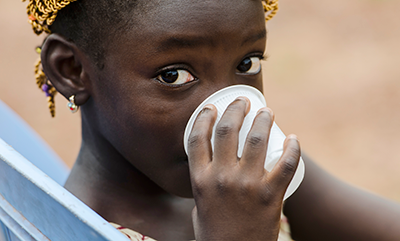African Parents Underreport Health Symptoms in Girls.
 Parents in sub-Saharan Africa were less likely to report episodes of fever and diarrhea among their female children, compared to males, suggesting a gender imbalance in reporting that undercuts accurate estimates of child illness, according to a study led by a School of Public Health researcher.
Parents in sub-Saharan Africa were less likely to report episodes of fever and diarrhea among their female children, compared to males, suggesting a gender imbalance in reporting that undercuts accurate estimates of child illness, according to a study led by a School of Public Health researcher.
The study, in the American Journal of Tropical Medicine and Hygiene, recommends more research into the possible reasons and “practical impact” of the apparent disparity, saying the underreporting of symptoms in girls may indicate that “a tremendous amount of untreated illness goes unnoticed.”
The authors investigated differences in symptom reporting by child gender in a sample of countries in sub-Saharan Africa, using national surveys based on parents’ reports of their children’s health. Overall, both fevers and diarrhea were reported significantly less often for girls than boys under age 5.
The researchers ruled out the possibility that quicker medical treatment of girls was a reason for the disparity. The opposite was true: Parents of girls were less likely to seek care for reported fever/cough or diarrhea, suggesting that treatment differences did not explain the differences in reporting.
Similarly, the authors found that girls had the same chances as boys of exposure to one fever-causing agent—the malarial parasite—indicating that lower rates of infection exposure were likely not a factor in the lower reporting.
In a subsample of children in Nigeria, parents were asked to report on child fevers at the same time that clinicians recorded their body temperatures. For children who had fevers at the time of measurement, the probability of parents reporting fever was consistently higher for boys than for girls, the data showed.
The authors speculated that differences in reporting could stem from several factors. Parents may interact more with boys, leading to better recognition of symptoms, or they may interpret information conveyed by boys about symptoms differently than by girls.
Alternatively, they posited, gender differences in reporting could reflect a more general form of gender inequality in society. Previous research has shown that, in many low-resource settings, parents invest less in girls in terms of vaccinations, nutrition, health care, and education.
“Future work should distinguish the degree to which gender differences in reporting are due to challenges in recognizing illness, versus deliberate underinvestment in girls relative to boys,” the authors said. “This research would allow for greater certainty in interpreting the implications of differences in reporting based on child gender.”
Lead author Peter Rockers, assistant professor of global health, said that, regardless of the reasons for the disparity, the imbalance in reporting has profound implications for child health. The study found a “strong and significant” relationship between gender differences in fever reporting and infant mortality rates at the country level, in that the stronger the gender difference in reporting, the weaker the survival advantage of infant girls in a given country. Girls generally have lower rates of infant mortality in sub-Saharan Africa.
“From a measurement perspective, estimates of gender imbalances in child illness and treatment based on parental reports may be inaccurate,” Rockers said. “From a public health perspective, parental underreporting of symptoms in girls may indicate a tremendous amount of untreated illness that goes unnoticed.”
The study was co-authored by Margaret McConnell of the Harvard T.H. Chan School of Public Health.